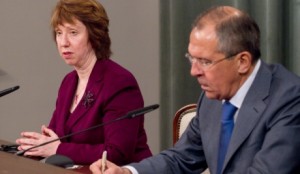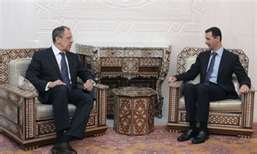 As Europe suffers a severe a cold snap, EU-Russian relations are experiencing a proverbial chill. The diplomatic cooling is the result of EU foreign policy chief Catherine Ashton’s criticism of Putin’s democratic credentials. The sharpness of Ashton’s critique was for many a somewhat surprising, yet desirable development. Indeed, the tough stance on the state of Russian democracy has provided Ashton with rare kudos from commentators and MEPs. Could these new tones be a sign of a more confrontational EU stance on Russia’s human rights record?
As Europe suffers a severe a cold snap, EU-Russian relations are experiencing a proverbial chill. The diplomatic cooling is the result of EU foreign policy chief Catherine Ashton’s criticism of Putin’s democratic credentials. The sharpness of Ashton’s critique was for many a somewhat surprising, yet desirable development. Indeed, the tough stance on the state of Russian democracy has provided Ashton with rare kudos from commentators and MEPs. Could these new tones be a sign of a more confrontational EU stance on Russia’s human rights record?
Among Ashton’s critique points was the government decision not to register Grigory Yavlinsky, leader of the opposition party Yabloko, for the March election, the intention of Putin and Medvedev to swap jobs (again!), and more generally a support of the Russian people’s desire to “rein in corruption and impunity, and to give more breathing space to democratic process.” Of course, Ashton also urged Russia to not veto the UN Security Council resolution on Syria.
Russian officials were quick to shoot back, accusing the EU of meddling in internal affairs, calling Ashton’s criticism “bewildering” and saying that it “overstepped the bounds of political correctness.” In the official Russian view, the EU and US are using the democracy movement as a pretext to leverage influence in Russia through utilization of the Organization for Security and Cooperation in Europe (OSCE), and pro-democracy organizations.
Needless to say, Russia and China disregarded all pressure and vetoed the Security Council’s Syria resolution. Russia and China have since been catching some well-deserved flak from the international community, not that that will have an immediate effect on the ground in Syria. But, in this context, it has had an effect on global opinion of Putin’s Russia and how to deal with it.
Arguably the EU is now finding a new more confrontational diplomatic footing, with more emphasis on supporting democratic developments in Russia. Some might say that it’s about time. But it seems fair to say that Putin’s current hardships were unforeseen by most, including the EU. Where Europe previously was preparing to deal long-term with a Russia like the one Putin took over in 2000, the game has now changed and the EU’s stance has changed with it.
For example, the December 2011 EU-Russia Summit was dominated by preexisting issues, such as visa-free travel and Russia joining the World Trade Organization. Although human rights and democracy issues were discussed at the summit, Ashton’s statements on these matters were deemed “weak” by Mikhail Kasyanov, leader of the opposition party Parnas. Human rights are now center stage, and Ashton statements have grown stronger.
In previous years, EU members states have by-and-large followed a policy of pursuing economic goals, while limiting their criticism of human rights abuses. The European Council on Foreign Relation’s European Foreign Policy Scorecard points to EU diplomacy being a result of an overriding wish for cooperation with Russia on a swath of issues, ranging from trade to global security and cooperation in the Russian/European neighborhood. Putin’s actions at home and abroad have damaged the assumptions that the policy of cooperation policy built on, i.e. that economic modernization and engagement would gradually bring about a more democratic Russia.
Naturally, there are limitations to the EU’s ability to influence Russia. Disagreements over ending frozen conflicts in Georgia and Kosovo are examples. And of course, cold snap and all, Russian natural gas has previously provided Putin with a stick with which to beat the Europeans. But limitations will always exist. The EU now has an opportunity to test these limitations.
Ashton’s critique of Putin’s Russia is a good thing. These days, how else is one to react but with support of those who come out in favor of democracy movements? And in this respect, Putin is certainly not looking stellar. Putin and Assad are all too easy to lump together as autocratic brothers-in-arms, each trying to retain their grip on power with the methods that happen to be at their disposal.
While not forgetting that Russian cooperation is necessary to solve the issues of the day, e.g. Russia’s role in negotiations with Iran, we must hope that the EU will maintain its pressure on Putin’s Russia. In an age where democratic reform is a rallying cry, Putin quiet possibly has made a big mistake throwing in his lot with the likes of Assad. This offers an opportunity that should not be left untried.